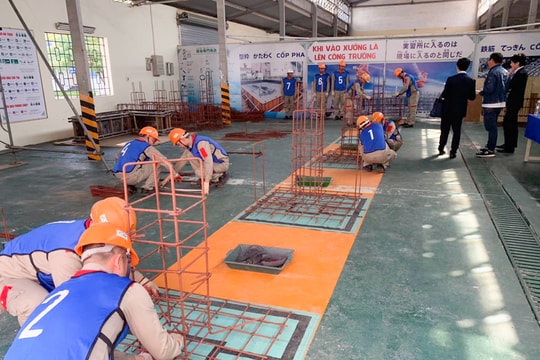The Yen has fallen sharply, making it even more difficult for Nghe An workers in Japan.
(Baonghean.vn) - The continued fall in the Yen has directly affected the lives of Nghe An workers in Japan. At this time, some people choose to stay to save money to cover their living expenses and wait for the Yen to rise, while others find ways to return to their hometowns to make a living.

Life is hard because of the falling Yen
Faced with the increasingly falling value of the Yen, Nghe An workers in Japan are having a hard time, having to find ways to adapt and make ends meet. Many do not dare to exchange money to send back to their families due to “heavy losses”, so they have to choose the option of “saving money” and waiting for the Yen to recover.
Mr. Tran Tien Minh in Nghi Quang commune, districtNghi Loc, a seafood processing worker in Hokkaido (Japan), said that his current salary in Vietnamese currency is 22 million VND, but now that the Yen price has dropped, converting it to Vietnamese currency to send back to his family, his income has decreased by 6-7 million VND/month.
Mr. Minh added: Currently, there is no other choice but to try to save and spend reasonably to stay in Japan to earn money to cover living expenses, and to send money back home to pay off the family debt to pay for the labor export fee.
Mr. Tran Quang Hieu - Director of HCM Mirai Joint Stock Company (a labor export unit in Vinh City) shared more: The devaluation of the Yen has affected workers in Japan, some workers want to return home to go to other countries with higher income. In previous years, each year the unit exported from 1,000 to 1,200 workers to Japan, in 2023 alone, only over 500 workers went to Japan. From the beginning of 2024 until now, 150 people have come to the unit just to learn about the Japanese market but have not signed any contracts... According to Mr. Tran Quang Hieu, if the Yen increases again, going to Japan still has many advantages, a stable labor market, standard orders, and few risks...
Mr. Dang Van Luong - Head of the Department of Labor, War Invalids and Social Affairs of Nghi Loc district said: Up to now, the whole district has 3,100 workers in Japan, every year there are 300 - 400 workers going to Japan. In the past time, the Japanese labor market is still considered a favorite market, low cost of going, working in a safe environment, stable income. If the Yen increases again, this will also be a suitable choice for rural households.

Similarly, in Yen Thanh district, there are currently quite a few workers in Japan. Mr. Nguyen Van Minh in Phu Thanh commune (Yen Thanh) has been working in the construction sector in Kyushu for nearly 2 years, said: The Yen-VND exchange rate is too low, the cost of living in Japan is high, plus having to pay bank interest in the countryside, so it is a double loss. Many friends advise me to keep Yen in my account, when the exchange rate increases, I will send it back to Vietnam to convert to Vietnamese currency, but I have to send it back to pay off my debt, so I accept the loss.
According to Mr. Vu Van Quyen - Deputy Head of the Department of Labor, War Invalids and Social Affairs of Yen Thanh district: Yen Thanh district currently has over 3,500 workers in Japan, of which 800 workers will go to the Japanese market in 2023 alone. Due to the sharp decline in the Yen, from the end of 2023 until now, fewer workers have chosen to go to Japan. They mainly choose to go to high-income orders such as Korea, Taiwan, and European markets.
Workers choose potential markets
Talking online, an export worker in the Japanese market said: Currently, the Yen is very low in value, specifically; 1,000 Yen used to be converted to 230,000 VND, now 1,000 Yen can only be converted to fluctuate between 163,000 - 170,000 VND. In that situation, some Nghe An workers in Japan also shared their experiences with those who intend to go to Japan to work, what to do to improve income when the Yen exchange ratedown low
That is the choice to participate in the recruitment of orders that require a lot of overtime, choose orders in the suburbs, provinces, should not work in the city center. Because although the salary in the city is relatively high, it will mean that the cost of living is expensive, will not save much.
Ms. Dang Thi Phuong Thuy - Deputy Head of the Department of Labor, Employment and Labor Safety, Department of Labor, War Invalids and Social Affairs said: Japan is the main market for Nghe An laborers, currently there are over 60,000 Nghe An workers in Japan, every year there are 8,000 - 9,000 workers going to the Japanese market to work. However, recently, the Japanese Yen has fallen in value, so this labor export market is showing signs of decline, people are choosing other markets with better income.

Through research, it is shown that currently, Nghe An area has many new factories, recruiting many workers with stable salaries, many workers choose to work near home to reduce costs, save money, and have conditions to take care of their families. In addition, many workers choose other potential export markets with better income.



